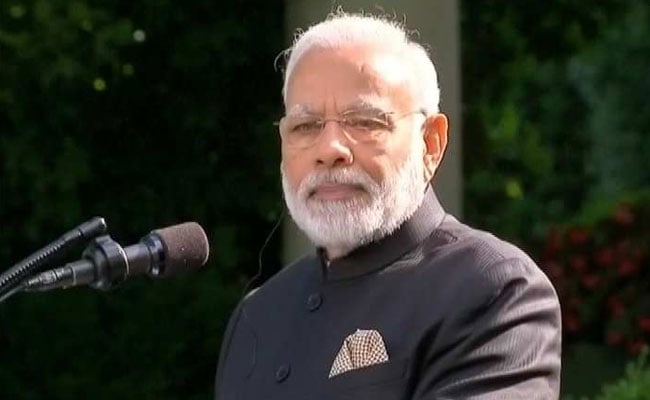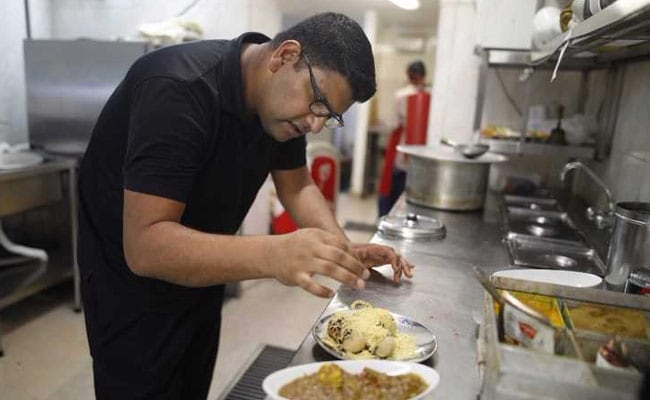
PM Narendra Modi's three-day visit to Israel begins today; Indian community in Israel excited
Ramla, Tel Aviv:
At a curry house in central Israel, a poster welcoming Prime Minister Narendra Modi greets patrons even before they encounter the rich scent of spices wafting from the kitchen.
PM Modi's three-day visit beginning today -- the first ever of an Indian Prime Minister to Israel -- is a landmark moment for the Jewish state, a country seeking the friendship of powerful allies and customers for its advanced military equipment.
But for members of the small Jewish Indian community in Israel, the trip is a cause of genuine excitement and a unique opportunity to increase their visibility.
"There's not a single (Indian) household that's not talking about it. This is all people are talking about," said Elazar Ashtivker, owner of the Maharaja restaurant in the city of Ramla, south of Tel Aviv.
"It's historic," he said.
The fast-talking 33-year-old's parents, who were born in India, opened the restaurant in its first incarnation in the 1980s because they felt "the community was in decline".
Initially, the restaurant served the Indian community nearly exclusively.

But in the 1990s the trend of Israelis travelling to Asia after completing their military service became wildly popular, and many returned home with a taste for the Maharaja's spicy delicacies.
The restaurant serves what Ashtivker calls "mainstream Indian food" but also sells peppers, vegetables and imported spices.
The wording on the poster is in the colours of the Indian flag and invites members of the Indian community, in Hebrew and English, to a July 5 meeting with PM Modi in Tel Aviv.
"There's a lot of excitement," Ashtivker said. "Everyone has signed up and everyone is going."
"If you looked for Indians in Israel on the 5th you won't find any. They'll all be at the convention centre," he said with a laugh.
- 'Invisible Jews' -
Estimates put the number of Jews of Indian origin in Israel at about 100,000, according to Eliaz Dandeker, a historian and author documenting the community.
Even those of Indian origin born in Israel maintain a "deep connection" to their ancestral homeland, said Dandeker, including through music, cinema, food and cultural events.
 Events in Israel have featured appearances by Indian actors.
Events in Israel have featured appearances by Indian actors.
Jews made their way to India over the course of the last 3,000 years, and by and large have not suffered religious and racist persecution in the country.
They began coming to Israel en masse in the late 1940s and early 1950s for religious and other reasons.
Many of them settled in rural communities to become farmers, while others moved to peripheral towns throughout the country.
In the first years following the creation of the state of Israel in 1948, many Indian immigrants abandoned their names and traditions as part of the era's "melting pot" ideal.
"There's more openness today" to Indian culture, the 34-year-old Dandeker said. "The younger generations want to know more."
- 'He's special' -
In his spice shop near the Maharaja, Shaul Divekar, who emigrated from India as a child, scoops red lentils from a sack into a plastic bag, chatting from behind his counter with two customers.
The conversation fluctuates between the goods that arrived from India and the prime minister who is about to.
Divekar proudly notes he is in charge of one of the seven buses taking Indian Israelis from Ramla to Wednesday's meeting with PM Modi.
"He's special," Divekar said of PM Modi, a Bollywood music video playing on a laptop behind the cash register.
"He likes Jews," proudly offers a tall bearded man in his 30s standing nearby the Indian DVD collection in Divekar's store, his Hebrew heavy with an Indian accent.
Dandeker, the historian, notes that Jewish Indians in Israel have been called the "invisible Jews" since they are neither Ashkenazis from Europe nor Sephardis from Africa and the Middle East.
While members of the community have reached prominence in Israel in fields including medicine and the military, "a lot of them don't stress their origins".
And with many of them having changed their last names to sound more Israeli, "it's hard to spot them," said Dandeker.
PM Modi's visit and its potential to generate interest among Israelis in Indian culture could help raise the profile of the Indian community.
"We expect it to help advance our community," said Ashtivker, the restaurateur. "We're a small community here and don't really stand out."
(This story has not been edited by NDTV staff and is auto-generated from a syndicated feed.)
PM Modi's three-day visit beginning today -- the first ever of an Indian Prime Minister to Israel -- is a landmark moment for the Jewish state, a country seeking the friendship of powerful allies and customers for its advanced military equipment.
But for members of the small Jewish Indian community in Israel, the trip is a cause of genuine excitement and a unique opportunity to increase their visibility.
"There's not a single (Indian) household that's not talking about it. This is all people are talking about," said Elazar Ashtivker, owner of the Maharaja restaurant in the city of Ramla, south of Tel Aviv.
"It's historic," he said.
The fast-talking 33-year-old's parents, who were born in India, opened the restaurant in its first incarnation in the 1980s because they felt "the community was in decline".
Initially, the restaurant served the Indian community nearly exclusively.

PM Narendra Modi's three-day visit to Israel begins today
But in the 1990s the trend of Israelis travelling to Asia after completing their military service became wildly popular, and many returned home with a taste for the Maharaja's spicy delicacies.
The restaurant serves what Ashtivker calls "mainstream Indian food" but also sells peppers, vegetables and imported spices.
The wording on the poster is in the colours of the Indian flag and invites members of the Indian community, in Hebrew and English, to a July 5 meeting with PM Modi in Tel Aviv.
"There's a lot of excitement," Ashtivker said. "Everyone has signed up and everyone is going."
"If you looked for Indians in Israel on the 5th you won't find any. They'll all be at the convention centre," he said with a laugh.
- 'Invisible Jews' -
Estimates put the number of Jews of Indian origin in Israel at about 100,000, according to Eliaz Dandeker, a historian and author documenting the community.
Even those of Indian origin born in Israel maintain a "deep connection" to their ancestral homeland, said Dandeker, including through music, cinema, food and cultural events.

Elazar Ashtivker, owner of the Maharaja Indian restaurant in the city of Ramla
Jews made their way to India over the course of the last 3,000 years, and by and large have not suffered religious and racist persecution in the country.
They began coming to Israel en masse in the late 1940s and early 1950s for religious and other reasons.
Many of them settled in rural communities to become farmers, while others moved to peripheral towns throughout the country.
In the first years following the creation of the state of Israel in 1948, many Indian immigrants abandoned their names and traditions as part of the era's "melting pot" ideal.
"There's more openness today" to Indian culture, the 34-year-old Dandeker said. "The younger generations want to know more."
- 'He's special' -
In his spice shop near the Maharaja, Shaul Divekar, who emigrated from India as a child, scoops red lentils from a sack into a plastic bag, chatting from behind his counter with two customers.
The conversation fluctuates between the goods that arrived from India and the prime minister who is about to.
Divekar proudly notes he is in charge of one of the seven buses taking Indian Israelis from Ramla to Wednesday's meeting with PM Modi.
"He's special," Divekar said of PM Modi, a Bollywood music video playing on a laptop behind the cash register.
"He likes Jews," proudly offers a tall bearded man in his 30s standing nearby the Indian DVD collection in Divekar's store, his Hebrew heavy with an Indian accent.
Dandeker, the historian, notes that Jewish Indians in Israel have been called the "invisible Jews" since they are neither Ashkenazis from Europe nor Sephardis from Africa and the Middle East.
While members of the community have reached prominence in Israel in fields including medicine and the military, "a lot of them don't stress their origins".
And with many of them having changed their last names to sound more Israeli, "it's hard to spot them," said Dandeker.
PM Modi's visit and its potential to generate interest among Israelis in Indian culture could help raise the profile of the Indian community.
"We expect it to help advance our community," said Ashtivker, the restaurateur. "We're a small community here and don't really stand out."
(This story has not been edited by NDTV staff and is auto-generated from a syndicated feed.)
Track Latest News Live on NDTV.com and get news updates from India and around the world

